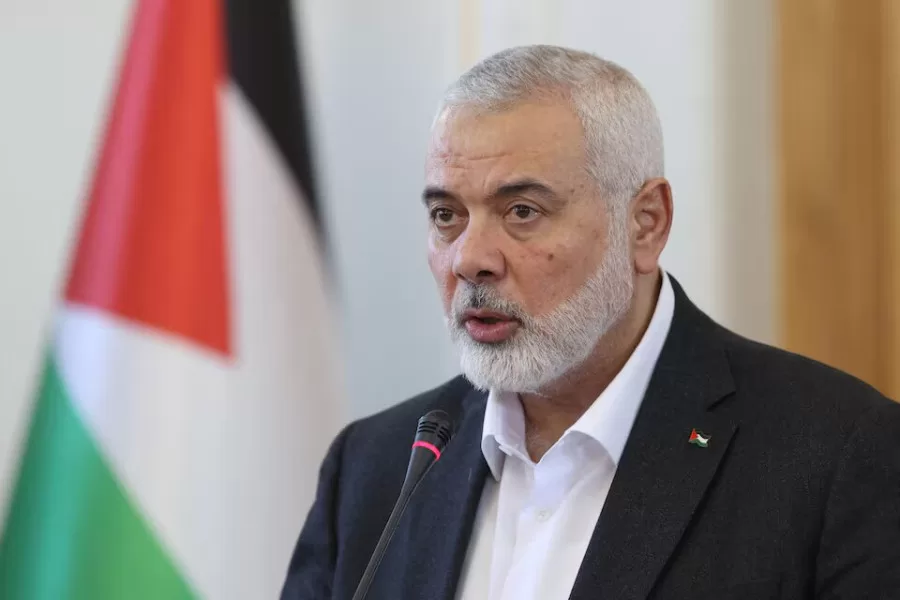Hamas leader Ismail Haniyeh was assassinated, Wednesday, in the early hours of the morning in Iran, the Palestinian militant group said on Wednesday, drawing fears of wider escalation in a region shaken by Israel’s war in Gaza and a worsening conflict in Lebanon, Reuters reports.
Iran’s Revolutionary Guards confirmed the death of Haniyeh, hours after he attended a swearing in ceremony for the country’s new president, and said it was investigating.
Iran’s President Masoud Pezeshkian said on Wednesday that it will “defend its territorial integrity, dignity, honor, and pride, and will make the terrorist occupiers regret their cowardly act” of assassinating Hamas leader Ismail Haniyeh in Tehran, according to Iranian media.
There was no immediate comment from Israel. The Israeli military said it was conducting a situational assessment but had not issued any new security guidelines for civilians. Prime Minister Benjamin Netanyahu was expected to meet for consultations with security officials at midday (0900 GMT).
U.S. Defense Secretary Lloyd Austin said Washington would work to try to ease tensions but said the United States would help defend Israel if it were attacked.
“I don’t think war is inevitable. I maintain that. I think there’s always room and opportunities for diplomacy,” he told reporters during a visit to the Philippines.
The news, which came less than 24 hours after Israel claimed to have killed the Hezbollah commander it said was behind a deadly strike in the Israeli-occupied Golan Heights, appears to set back chances of any imminent ceasefire agreement in Gaza.
“This assassination by the Israeli occupation of Brother Haniyeh is a grave escalation that aims to break the will of Hamas,” senior Hamas official Sami Abu Zuhri told Reuters.
He said Hamas, the Palestinian Islamist group that ruled Gaza, would continue the path it was following, adding: “We are confident of victory.”
Qatar, which has been brokering talks aimed at halting the fighting in Gaza, condemned Haniyeh’s killing as a dangerous escalation of the conflict. China and Russia have also condemned the assassination.
Iran’s top security body met to decide Iran’s strategy in reaction to the death of Haniyeh, a close ally of Tehran, in the Iranian capital, said a source with knowledge of the situation.
Palestinian President Mahmoud Abbas condemned the killing of Haniyeh and Palestinian factions in the occupied West Bank called for a general strike and mass demonstrations.
The assassination of Haniyeh comes as Israel’s campaign in Gaza approaches the end of its 10th month with no sign of an end to a conflict that has shaken the Middle East and threatened to spiral into a wider regional conflict.
Despite anger at Netanyahu’s government from families of the Israeli hostages still held in Gaza and mounting international pressure for a ceasefire, talks brokered by Egypt and Qatar appear to have faltered.
At the same time, the risk of a war between Israel and Hezbollah has grown following the strike in the Golan Heights that killed 12 children in a Druze village on Saturday and the subsequent killing of the senior Hezbollah commander Fuad Shukr.
Hezbollah has not yet confirmed Shukr’s death, but said he was in the building hit by an Israeli strike.
Haniyeh, normally based in Qatar, has been the face of the Palestinian group’s international diplomacy as the war set off by the Hamas-led attack on Israel on Oct. 7 has raged in Gaza. Three of his sons were killed in an Israeli airstrike.
The International Criminal Court prosecutor’s office requested an arrest warrant for him over alleged war crimes at the same time it issued a similar request against Israeli Prime Minister Benjamin Netanyahu.
Appointed to the Hamas top job in 2017, he has moved between Turkey and Qatar’s capital Doha, escaping the travel curbs of the blockaded Gaza Strip and enabling him to act as a negotiator in ceasefire talks or to talk to Hamas’ ally Iran.
His death, following the killing of his deputy Saleh Al-Arouri earlier this year by Israel, leaves Yehya Al-Sinwar, the Hamas chief in the Gaza Strip and the architect of the Oct. 7 attack on Israel, and Zaher Jabarin, the head of the group in the West Bank, in place but in hiding.
Further ahead, Khaled Meshaal, the group’s former chief, has emerged as a potential replacement as the public face of Hamas, but it remains unclear how the succession will be handled.
The war started on Oct. 7 when Hamas-led fighters broke through security barriers around Gaza and launched a devastating attack on Israeli communities nearby, killing 1,200 people and abducting some 250 hostages into Gaza, by Israeli tallies.
In response, Israel launched a relentless ground and air offensive in the densely populated coastal enclave that has killed more than 39,400 people, according to Gaza health officials, and left more than 2 million facing a severe humanitarian crisis.
Source link
